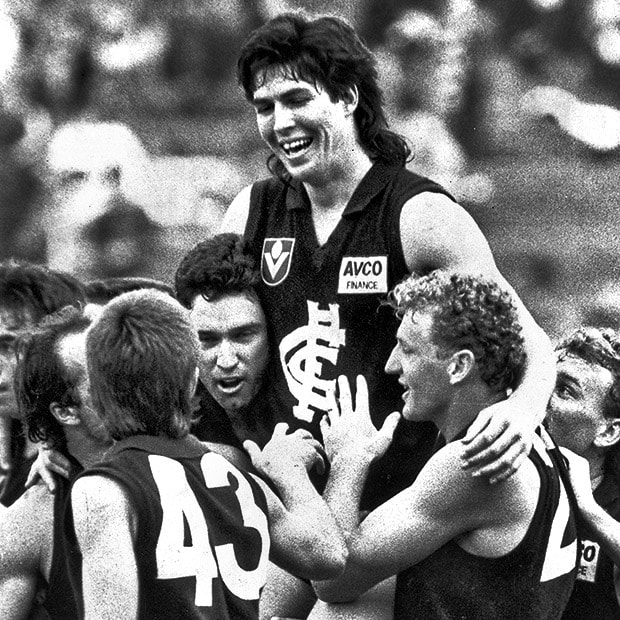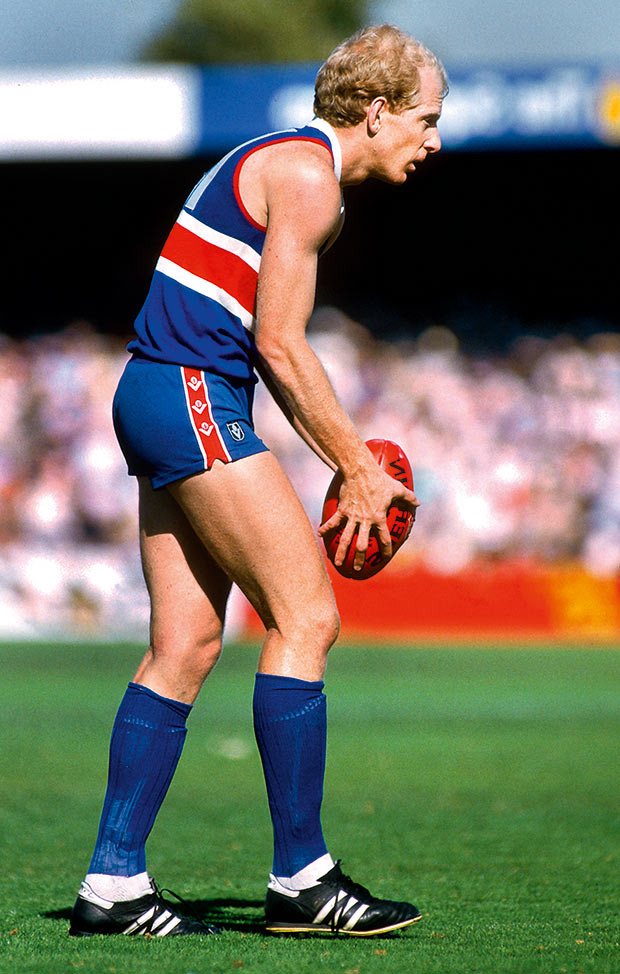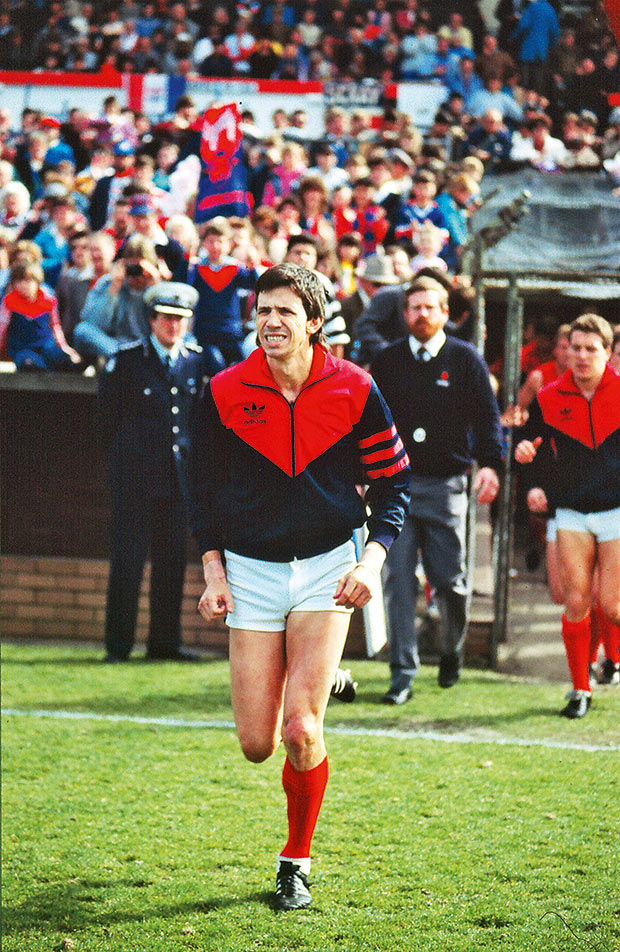With 11 teams still in the hunt for finals with one round to go, Ashley Browne revisits the last round 30 years ago, when the entire make-up of the finals was shaped in 30 drama-filled minutes of football.
NEVER before or since has a final round been as delicately poised as 30 years ago this weekend.
Seven teams were bidding to play in the finals and every spot in the final five was up for grabs. And in a fortuitous piece of fixturing, the four games to decide the make-up of the finals were all starting at 2pm on Saturday afternoon. The final round could not have been set up better.
After a tasty Friday night prequel in which the Brisbane Bears beat Richmond at the MCG to decide the wooden spoon, the next day dawned with Footscray hosting Melbourne at the Western (now Whitten) Oval with the winner having a leg-up into the finals.
Geelong could keep them both out, however, by beating second-placed Hawthorn at home.
And the Hawks were highly incentivised because if they won and first-placed Carlton lost to North Melbourne at Waverley, they would jump into top spot and sit at home with their feet up during the first week of the finals.
The Sydney Swans needed to beat Fitzroy at Princes Park to guarantee their double chance. It is impossible to recreate, blow by blow, the frantic final 30 minutes of football late that afternoon at four venues almost 150km apart.
As leads changed almost every minute, finals scenarios were constantly changing.
Stephen Kernahan is chaired off after his heroics
But the AFL Record did speak to some players from that day and their recollections of the drama and the urgency remain vivid.
Dwayne Russell, then a Geelong forward and now a commentator for 3AW and Fox Footy, remembers sitting on the interchange bench and watching the looming "car crash" as the Hawks came storming home at Kardinia Park.
The Cats were coached by John Devine, a former player from the 1960s and one of the last of the hot-gospelling, fire-and-brimstone types, but not so big on tactics.
They didn't get over-run at home all too often so, therefore, they didn't have a plan to deal with the fast-finishing Hawthorn.
"He was good for a 'gee up', but when it came to having a strategy, it was up to us to drop one back in defence to stand in front of a leading player," Russell said.
"We had no cheat sheet for how to stop Jason Dunstall."
Utility Russell Morris was the player who streamed through the midfield and put the ball lace out on the chest of Dunstall for the second of his two late goals that clinched the three-point win for the Hawks, who came from three goals down at the final change.
For just about any other team of the time, it would have been a win for the ages. However for the powerful and clinical Hawthorn, it was just another day at the office.
"If you just keep going and going, the scores look after themselves," Morris said. "Too many teams looked at the scoreboard in that situation."
There were more than 27,000 at the game and they departed Kardinia Park in stunned silence as the reality hit that the winner of the Dogs-Demons game would claim the remaining finals berth that had belonged to Geelong for most of the afternoon.
"I remember there being complete devastation in the rooms," Russell said.
Melbourne also trailed for most of the afternoon at Footscray in front of 31,249 fans, the third-largest crowd at that ground for those two clubs.
Many of them were Demons fans daring to dream of a first finals appearance in 23 years. The Bulldogs led for most of the day and, at home, were usually hard to stop.
But as Footscray full-forward Simon Beasley noted, "Melbourne got their act together and, once Robbie Flower lifted, they were hard to stop."
The Demons kicked 4.4 to 1.1 in the final quarter to win by 15 points. It was a fair effort in those days of just two players on the bench as they had lost star forward Garry Lyon to a broken leg in the second quarter.
The result came through from Geelong with a few minutes remaining at the Western Oval.
Melbourne supporters, with transistor radios glued to their ears, heard the doleful 3GL (now K-Rock) commentators call the final score from Kardinia Park and then let out an almighty roar, 23 years in the making.
"It was really disappointing for us," Beasley continued. "We heard the roar. Melbourne was into the finals."
Simon Beasley lines up for goal
They didn't need transistors at Waverley, one of only two League grounds at the time with an electronic scoreboard that displayed live progress scores from other grounds.
The Blues edged ahead of the Kangaroos in the third quarter after a slow start, but were set back on their heels in the final quarter as North came hard at them again.
The Kangas were fourth and had plenty to play for.
Third-placed Sydney trailed Fitzroy and if that result held and the Kangaroos won, they would finish third and earn themselves the double chance.
The Blues found themselves keeping an eye on the scoreboard in the final quarter.
"We knew that Hawthorn had beaten Geelong, so we needed to win," said wingman David Rhys-Jones.
"From winning not being important for us, to becoming very pivotal, it all happened very quickly."
With just seconds to go and trailing by two points, Carlton moved the ball quickly around the members wing and, from a boundary throw-in, Adrian Gleeson handballed to Justin Madden, whose mongrel punt was marked by skipper Stephen Kernahan, under pressure 20m out from goal, but on a tight angle.
As he went back, the siren went and all that was hanging on the result was the Blues' realistic premiership hopes.
Kick straight and they had the rails run into the Grand Final. Miss and they were handing that advantage to arch rival Hawthorn.
"The one thing about 'Sticks' (Kernahan) in '86 and '87 was that he was a very accurate kick for goal," Rhys-Jones said.
"We knew he had to kick it. I'm not sure if he was aware of it, but quite a few of us were."
He did kick it and it was deadly straight. The Blues won and finished top of the ladder, and as Rhys-Jones noted, "any chance to have a week off at that time of the year was enormous."
The Hawks were back to second, with the Swans third after they rallied to knock over Fitzroy.
North finished fourth and would meet Melbourne in the elimination final. The best final round of any season played itself out for weeks afterwards.
Flower finally got to play in a final and the Demons rode the emotional wave through a pair of MCG thrashings of North Melbourne in the elimination final by 118 points and the Sydney Swans by 76 points in the first semi-final.
Robbie Flower leads the Demons onto Whitten Oval
They lost a memorable preliminary final to Hawthorn when Gary Buckenara kicked the winning goal after the final siren, having been gifted a 15m penalty when a young Jim Stynes ran across the mark.
The rested Blues knocked over the Hawks in the second semi-final and beat them again in the Grand Final a fortnight later.
In any other year, entering the Grand Final with one game in three weeks might have been seen as a handicap, but not in 1987 when on the last Saturday in September, the temperature nudged 33 degrees.
It was one of the hottest Grand Finals on record, enough for legendary Hawk skipper Michael Tuck to ditch his trademark long-sleeved jumper.
The Hawks had nothing left in the tank.
The ripple effect of the final round was even felt when Carlton and North Melbourne played an exhibition game in London a fortnight after the season.
So humiliated were the Roos by their inept elimination final loss to the inspired Demons that they were whipped into a frenzy before the match at The Oval by coach John Kennedy.
The result was the infamous 'Battle of Britain' match, which greatly embarrassed the League as the two clubs went at each other hammer and tongs.


